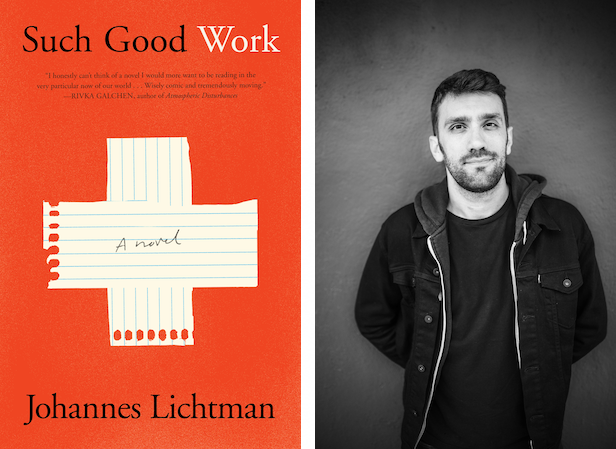More Events
2021
MALS Book Club Discusses Theatre
MALS Book Club discussed American Moor, a play by Keith Hamilton Cobb, with Simone Waller (English) at its spring gathering, and Appropriate, a play by Branden Jacob-Jenkins, with Kate Duffly (Theatre) at its fall gathering.
MALS Presents: Johannes Lichtman Reading and Conversations with Peter C. Baker
Portland-based author Johannes Lichtman read from his critically-acclaimed novel Such Good Work. He was joined in conversation by author Peter C. Baker.

Johannes Lichtman was named a 5 Under 35 honoree by the National Book Foundation for his debut novel, Such Good Work (Simon & Schuster). His writing has appeared in Tin House, The Sun, Los Angeles Review of Books, Oxford American, and elsewhere, and he is a regular contributor to Travel + Leisure. He holds an MFA in creative writing from University of North Carolina Wilmington and an MA in literature, culture, and media from Lund University. He was born in Stockholm and currently lives in Portland.
About the novel:
YOU DON’T HAVE TO BE PERFECT TO DO GOOD.
Jonas Anderson wants a fresh start. He’s made plenty of bad decisions in his life, and at age twenty-eight he’s been fired from yet another teaching position after assigning homework like, Attend a stranger’s funeral. But, he’s sure a move to Sweden, the country of his mother’s birth, will be just the thing to kick-start a new and improved—and newly sober—Jonas.
When he arrives in Malmö in 2015, the city is struggling with the influx of tens of thousands of Middle Eastern refugees. Driven by an existential need to “do good,” Jonas begins volunteering with an organization that teaches Swedish to young migrants. The connections he makes there, and one student in particular, might send him down the right path toward fulfillment—if he could just get out of his own way.
“Such Good Work is, indeed, a bit Jonas-like: it’s wary of affectation or grandstanding; it works small, as if from a sense of modesty, a reluctance to presume; it cuts sincerity with the driest of humor” (The New Yorker). In his debut, Lichtman, “a remarkable thinker” (The New York Times), spins a darkly comic story, brought to life with wry observations and searing questions about our modern world, and told with equal measures of grace and wit.
What the critics are saying:
“Lichtman [is] a remarkable thinker and social satirist…Such Good Work introduces a writer who is willing to openly contradict himself, to stand corrected, to honor both men and women, to ask sincere questions and let them ring unanswered.” —THE NEW YORK TIMES
“A funny and thoughtful book…Such Good Work gets to the heart of what it means to have a conscience.”—THE ECONOMIST
“Such Good Work is one of the best — one of the most beautifully written, one of the most thoughtful — novels I’ve read in the past several years.” —GARTH GREENWELL, NATIONAL BOOK FOUNDATION 5 UNDER 35 CITATION
Johannes was joined in conversation by author Peter C. Baker

Peter C. Baker’s essays, criticism, and reporting have been published by The New Yorker, The New York Times Magazine, The New York Review of Books, The Guardian “Long Read,” and elsewhere. He is currently a finalist for the international True Story Award, in recognition of his writing on Chicago high school students’ attempts to grapple with their city’s history of police torture. His first novel, Planes, to be published by Knopf next year, tells the story of lives in North Carolina and Rome linked by the CIA’s post-9/11 detention and interrogation practices.
2020
Clausing Leads MALS Book Club
Read about the fall 2020 discussion of Kimberly Clausing's Open: The Progressive Case for Free Trade, Immigration, and Global Capital.
2019
MALS Book Club Reimagines the Classical
A review of the April 2019 MALS Book Club discussion of Kamila Shamie's Home Fire, led by Jay Dickson (English).
2018
The MALS Alumni Book Club: A Classical Return
The MALS Alumni Book Club welcomed 20 readers in early November to discuss Euripides' the Bacchae with Walter Englert, Emeritus Professor of Greek, Latin, and Ancient Mediterranean Studies and Humanities. The Bacchae is one of the greatest Greek tragedies produced at Athens in the fifth century BCE. Euripides tells the story of the introduction of the worship of the god Dionysus (also known as Bacchus) into ancient Thebes. The play, written just before Athens’ defeat at the end of its long and destructive war with Sparta, addresses many of the crucial issues facing his audience: the relationship between gods and human beings, reason and irrationality, male and female, city (polis) and countryside, speech and action, and it also questions the nature of wisdom and reality itself. The Bacchae has been interpreted in many ways; our discussion explored the nature of Dionysus, the meaning of the play, and its relevance to the modern era.